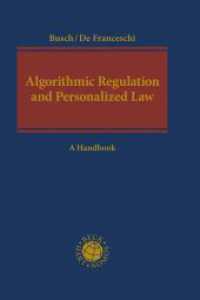- ホーム
- > 洋書
- > ドイツ書
- > Social Sciences, Jurisprudence & Economy
- > Politics, Society, Work
- > social science
Description
(Text)
Welche Zusammenhänge bestehen zwischen Raum, Kontrolle und Weltbild? Der Autor beantwortet diese Frage anhand des Konzepts des cognitive mapping, das er als theoretisches Konzept der Gesellschaftsanalyse sowie als empirisches Mittel der Forschung vorstellt und diskutiert. Überwachung - so seine These - macht die Überprüfung und Kontrolle von Weltbildern möglich und wird damit zu einer Form gesellschaftlicher Orientierung. Zugleich bieten Weltbilder auch eine Grundlage für das Verständnis von Einstellungen zu Überwachungsmaßnahmen. Überwachung in diesem Sinne ist kein Produkt der Moderne, sondern kommt in allen historischen Epochen vor und dient der Organisation von Realität. Raum und räumliche Vorstellungen von der Welt werden von der Umwelt und den Erfahrungen geformt, die Menschen in ihnen machen. Sozial-räumliche Vorstellungen sind Ursprungvon Diskursen der Überwachung und werden im Gegenzug durch Formen der Kontrolle beeinflusst. Über Weltbilder lassen sich Einstellungen u Überwachung und den dahinterstehenden Orientierungsmustern nachvollziehen. Das vorliegende Buch beschäftigt sich mit diesen Zusammenhängen anhand des Konzepts des cognitive mapping. Mit diesem Konzept werden Ursachen und Wirkungen analysiert und es wird erklärt, wie diese bei Prozessen sozialer Ausgrenzung/ Integration oder den Möglichkeiten von Identitätsformation eine wichtige Rolle spielen.
(Text)
What are the connections between space, control and world view? The author answers this question using the concept of cognitive mapping, which he presents and discusses as a theoretical concept of social analysis and as an empirical means of research. Surveillance - so his thesis - makes the examination and control of worldviews possible and thus becomes a form of social orientation. At the same time, worldviews also provide a basis for understanding attitudes towards surveillance measures. Surveillance in this sense is not a product of modernity, but occurs in all historical epochs and serves the organization of reality. Space and spatial notions of the world are shaped by the environment and the experiences people have in it. Socio-spatial conceptions are the origin of discourses of surveillance and are in turn influenced by forms of control. Worldviews can be used to trace attitudes and surveillance and the orientation patterns behind them. This book deals with these interrelations using the concept of cognitive mapping. This concept analyses causes and effects and explains how they play an important role in processes of social exclusion/integration or the possibilities of identity formation.
(Author portrait)
Dr. habil. Nils Zurawski, Institut für Kriminologische Sozialforschung der Universität Hamburg








